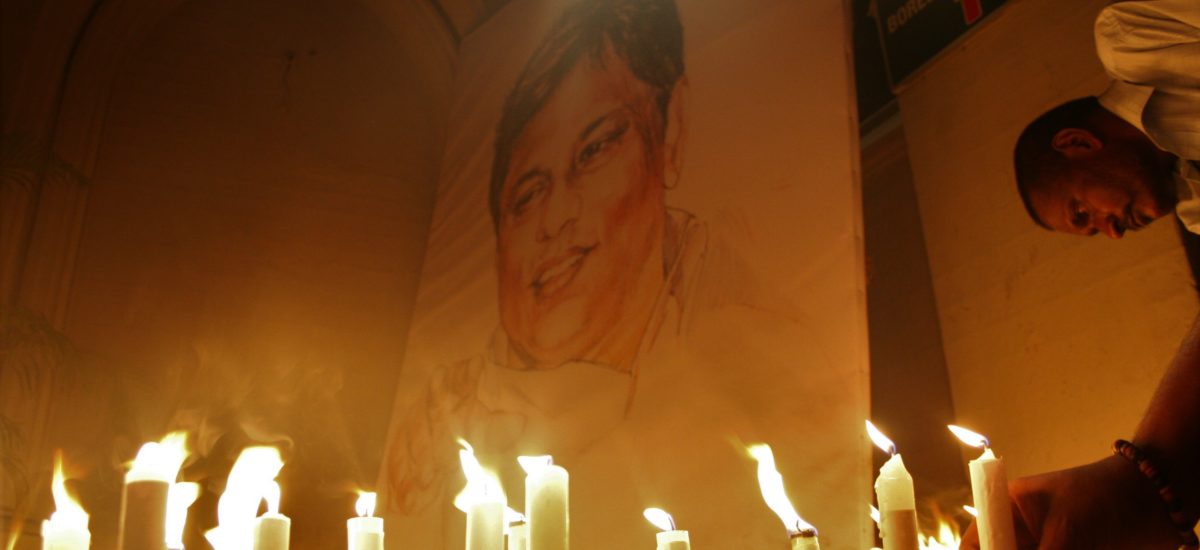Photo courtesy Amantha Perera
A not-so-young man walked into the room of Lasantha Wickrematunge two decades ago. The man had nothing but a recommendation from his own father when he asked Lasantha for a writer’s post. Lasantha later told that man that he took a chance when he gave the man a low-paying job as a journalist. That is how my journey as a story-teller began. Lasantha’s newspaper was the prefect stable for the non-conformist in me who sought to plough and scythe their own path, not walk the road taken by others. Lasantha gave me more chances to work on important stories than I would have been able to get at any other place.
In April 2002, LTTE leader Veluppillai Prabhakaran was planning to have what was to be his last media interaction. It was one big media scrum; all the big names in national and international media were lining up to get there. I had no chance in that pecking order – that is, if it was any other newspaper in Sri Lanka. The Leader under Lasantha was different. Three days before the presser, I walked into his room to ask if I could attend it. The plan was to either hitch a ride or take public transport. Lasantha not only said ok but added a vehicle and a driver, and cash to cover the expenses.
If not for Lasantha, I would not be doing what I am doing today. He moulded me during those initial years, and he made me into who I am today. He was the first person to believe in my abilities, even before I did. In October 2001, when the East-West Centre offered me the Jefferson Fellowship, I had no means of buying the air ticket. I told Lasantha, who was a Jeff Alumni himself, that I was going to refuse the fellowship. He asked me to f*** off. Ten minutes later, my phone rang. On the other end was the man in the next room who told me to go collect my ticket from Garbo Travels. Lasantha had got me the ticket by bartering ads in the newspaper. Two years later the Jeffs opened the door for me to study at UC Berkeley.
Lasantha was political. He chose his sides cut and dry, sticking with them until the bitter end. I had no problems with that. In fact, I preferred that his political powerplay was predictable, albeit fluid.
Why?
Because he never forced me to choose sides. I got to do my reporting the way I thought fit. His sides, his allegiances, were quite clear to me, unlike with other newspaper editors who feigned independence. There were no political demi-gods close to the editor that was untouchable; at least, not to me.
During my short stint as a parliamentary correspondent (which I hated), some of my best stories came from sources who did not hide their aversion of my editor. On many occasions, story tips would be bookended by unsavoury comments of my own editor.
It was Lasantha who gave me the space to write about the humanitarian crisis that was unfolding in the North and East. Until then, the conflict solely had a military angle with armchair military analysts decoding weekly events as if they were moves on a chessboard. The chessboard was filled with tens of thousands of civilians trapped in a war, not of their making. I don’t think Lasantha consciously wanted to be a paragon of humanitarian reporting; it is just that you could convince him if you had, in his own words, ‘all the bases of the stories covered’. If he backed you once, he would back you again and again.
The journey that began in that editor’s room at No 8 Ward Place, Colombo 7 has been unimaginably rich and life-giving. From the parlours filled with power-brokers to the foothills of the Himalayas, I have travelled to tell the stories of others. They have opened their innermost selves to me, placed their trust in me to tell their stories. I see no other future for me than this.
If not for Lasantha Manilal Wickrematunge, none of that would be possible.

